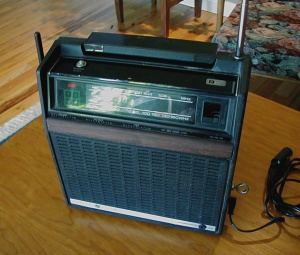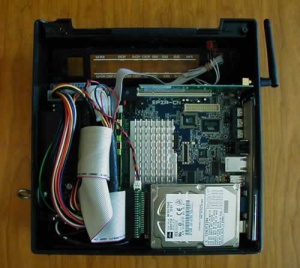8track: Difference between revisions
Brian Wilson (talk | contribs) mNo edit summary |
Brian Wilson (talk | contribs) mNo edit summary |
||
| Line 1: | Line 1: | ||
My system "8track" is a Via CN10000 Mini-ITX board built inside | My quest for a low power server began in the [[Carbon Diet]] page and now continues with this system. It is smaller, faster, and uses less energy than the earlier [[EPIA 800]] system. | ||
When I was riding around Corvallis one day, I saw a free pile in front of someone's house. Right on top was a GE portable AM/FM 8 track player. I could no t pass it up. I immediately envisioned putting a computer in the case and that is exactly what happened. | |||
"8track" is now a complete computer system based on a Via CN10000 Mini-ITX board built inside the 8 track player case. It has | |||
# 1GB of DDR2 RAM, | # 1GB of DDR2 RAM, | ||
Revision as of 20:34, 3 August 2006
My quest for a low power server began in the Carbon Diet page and now continues with this system. It is smaller, faster, and uses less energy than the earlier EPIA 800 system.
When I was riding around Corvallis one day, I saw a free pile in front of someone's house. Right on top was a GE portable AM/FM 8 track player. I could no t pass it up. I immediately envisioned putting a computer in the case and that is exactly what happened.
"8track" is now a complete computer system based on a Via CN10000 Mini-ITX board built inside the 8 track player case. It has
- 1GB of DDR2 RAM,
- a 30 GB Toshiba drive borrowed from a Toshiba Magnia SG20
- a Morex 60 watt automotive power supply
- a Trendnet WiFi PCI card
Power options include using either an old HP Omnibook 800 laptop power supply or a 12 volt gel cell. At the Solar CREEK booth at DaVinci Days, I ran it on a solar panel and a 120 vac inverter.
I can plug it into any convenient monitor and keyboard. At DaVinci days, I used an Acer 15" display and a PS/2 keyboard and mouse. The monitor ran off the inverter, too. I plugged in stereo speakers and connected to the Solar CREEK web site via a wireless link.
The HP power supply puts out about 35 watts and it had no trouble running this machine in the above configuration. I measured output of the supply and found it takes about 10 watts to run.
I am running Ubuntu Linux on it at the moment (6.06/Dapper Drake). I use mplayer to play the official Solar CREEK quicktime video.
Pictures

